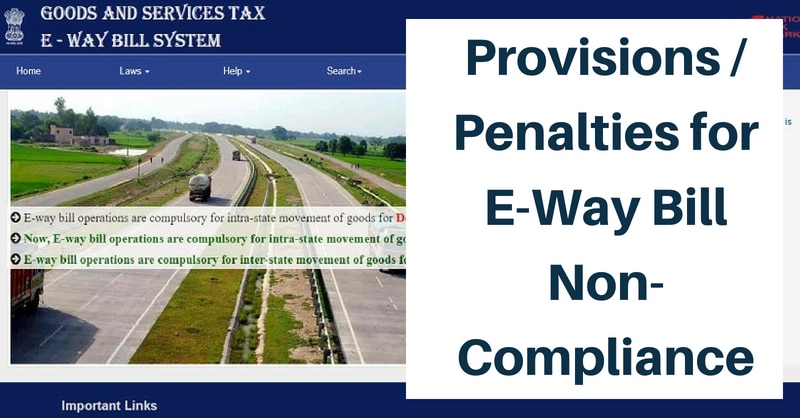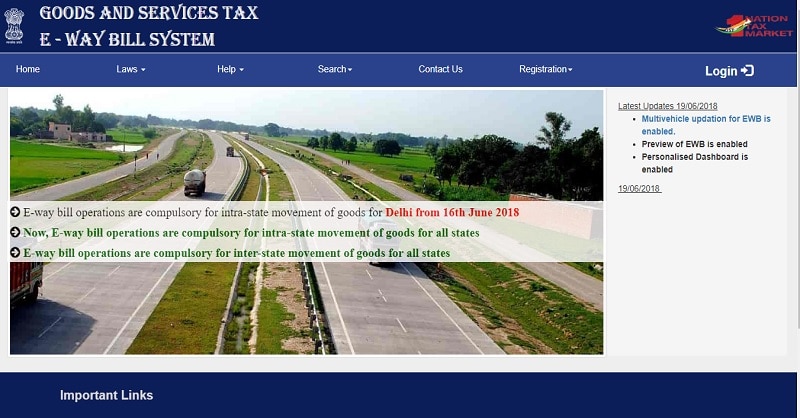or GST E-Way Bill Non-Compliance

E-Way Bill has become mandatory for the Inter-State as well as the Intra-State movement of goods after 1st April 2018. Let us discuss the provisions/penalties for GST E-way Bill Non-Compliance in this article.
Provisions/Penalties For GST E-Way Bill Non-Compliance
Many questions have been raised on whatsaap groups, facebook groups as well as other mediums. We will try to answer as many questions as possible.
When and How GST E-Way bill is applicable?
Answer: GST E-Way Bill has been made compulsory for inter-state supplies from 01 April 2018. However, for intra-state supplies, E-Way has been enabled in various states earlier. E-Way bill has to be given for inter as well as intrastate supplies exceeding Rs. 50,000.
What will happen if goods are transported without the cover of Invoice or GST E-Way bill?
Answer: If goods are transported without invoice or E-Way bill then penal provisions would be applicable. A penalty amounting to the tax payable or an amount of Rs 10,000 whichever is higher would be levied in case of default.
Example
If a dealer transports goods worth Rs 4 Lakhs taxable at the rate of 28% i.e Rs 112,000 is tax amount, without the invoice or E-Way bill then the penalty will be higher of –
Rs 10,000 or
Tax payable on such goods here Rs 112,000.
Hence, the penalty here will be Rs 112,000.

What if goods are transported without the cover of the invoice and E-Way bill and the goods are detained /seized by inspector/Tax officer?
Answer: If the tax officer detains such goods then for releasing such goods and conveyance the owner of the goods needs to pay penalty as under-
When the owner of the goods comes forward to pay penalty and tax amount penalty will be equal to 100% of tax payable on such goods also the owner needs to pay tax on such goods at the same time. In case of exempted goods, the penalty will be 2 % of the value of goods or Rs 25,000 whichever is less.
When the owner of the goods do not come forward to pay penalty and tax amount, the penalty will be equivalent to 50% of the value of goods as reduced by tax paid also the owner needs to pay tax on such goods at the same time. In case Exempted goods, the penalty will be 5% of the value of the goods or 25,000 whichever is less.
The taxpayer can also give security for the amount equivalent to amount 1 or 2 above, in the way prescribed by the officer.
Example
If goods worth Rs 4,00,000 has been detained and the applicable tax rate is 28%, then the taxpayer has to pay:
Tax (Rs 112,000) as well as penalty ( Rs 112,000)
Tax on goods transported i.e Rs 112,000 as well as Penalty i.e Rs 88,000 (50% of the value of goods (4,00,000*50%=2,00,000)-tax Paid( Rs.112,000/-).
The taxpayer can also give security worth the penalty amount.
What actions can be taken by the tax officer?
Answer: The Appointed officer may check goods at check posts. He can also check various documents that are required to be carried along with E-Way bill. If the officer is satisfied that tax has been evaded then goods can be confiscated by the officer after giving an order for the same. Once the goods are checked at one check post then such goods would not be checked at any other post.
Conclusion
Taxpayers must ensure that the goods transported should be issued with E-Way bill if the consignment value exceeds Rs 50,000 and while transporting the goods, the taxpayer must know the value of the goods, the total tax on such goods, and it must be transported with invoice copy and e-way bill.
The transactions in E-Way bill must be taken in the books. This might be cross-checked by the department. Hence taxpayers must check all the details and then only issue E-Way bill.
You can also download GST excel Templates like GST Receipt Voucher, GST Refund Voucher, GST Invoice format for Retailers and many other templates.
We thank our readers for liking, sharing and following us on different social media platforms.
If you have any queries please share in the comment section below. I will be more than happy to assist you.
FILED UNDER: GST TAGGED WITH: E WAY BILL, E-WAY BILL UNDER GST REGIME, EWAYBILL, GST, GST 2017, IMPORTANT FACTS ABOUT E-WAY BILL UNDER GST REGIME, INTER STATE MOVEMENT OF GOODS UNDER GST, MOVEMENT OF GOODS INTRA STATE UNDER GST FOR MORE THAN RS. 50000
Comments
Post a Comment